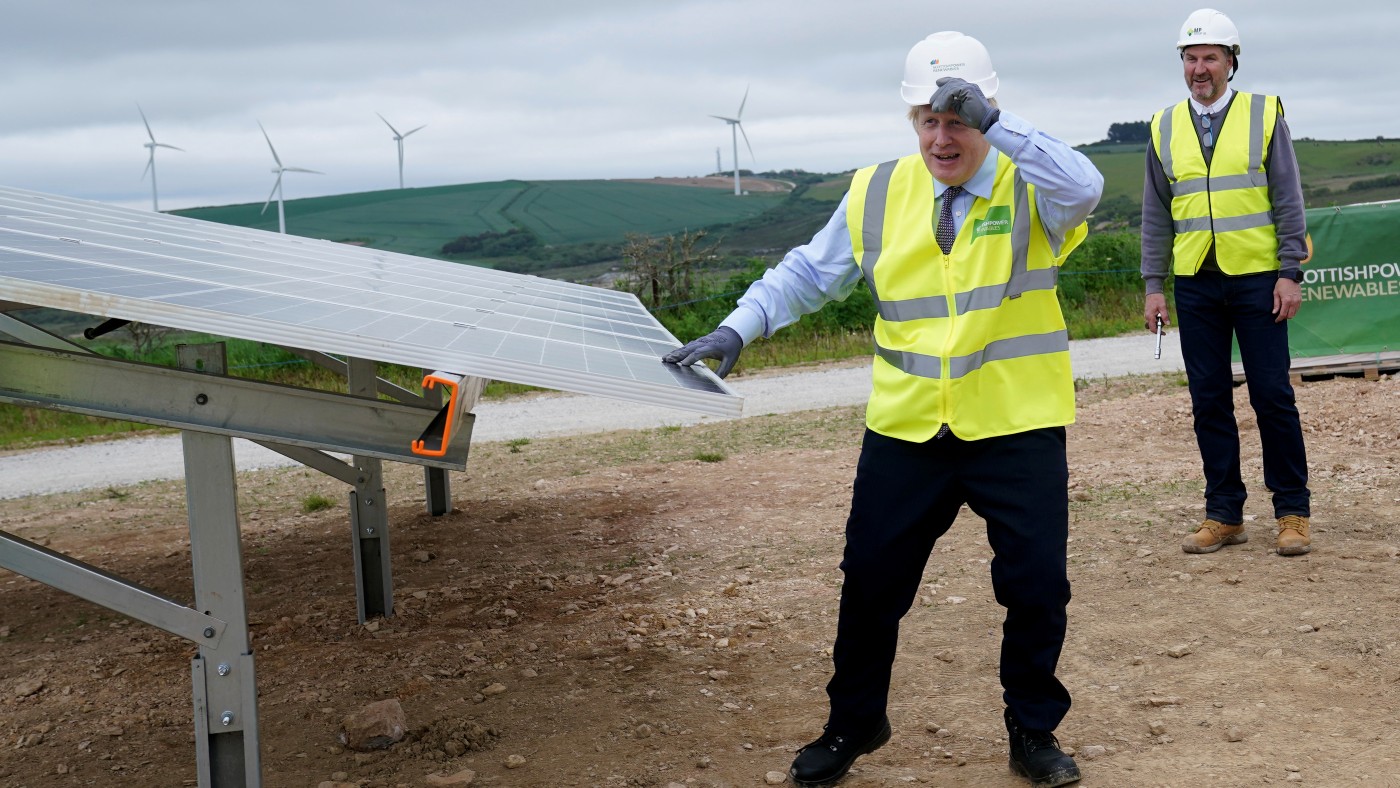Will the PM’s net zero strategy really create ‘good jobs, green jobs, well-paid jobs’?
Boris Johnson claims his plans to cut carbon emissions will help create 440,000 jobs by 2030

A free daily email with the biggest news stories of the day – and the best features from TheWeek.com
You are now subscribed
Your newsletter sign-up was successful
“We can build back greener, without so much as a hair shirt in sight.” So said the Prime Minister, in his typically ebullient introduction to the Government’s strategy for reaching net-zero greenhouse emissions.
On the one hand, we should be glad that the Government has finally published the plan, said Andrew Grice in The Independent. The bad news is that it is light on detail, and heavily reliant on Boris Johnson’s trademark “it will be all right on the night” approach.
He promises that the target can be achieved by promoting the development of wind power, hydrogen power, electric vehicles, and carbon capture and storage. These initiatives will transform the economy, he says, and help create 440,000 jobs by 2030; and by 2050, “in every part of our United Kingdom, there will be jobs. Good jobs, green jobs, well-paid jobs, levelling up our country while squashing down our carbon emissions.”
The Week
Escape your echo chamber. Get the facts behind the news, plus analysis from multiple perspectives.

Sign up for The Week's Free Newsletters
From our morning news briefing to a weekly Good News Newsletter, get the best of The Week delivered directly to your inbox.
From our morning news briefing to a weekly Good News Newsletter, get the best of The Week delivered directly to your inbox.
This is the “holy grail” of climate action, said Philippa Nuttall in the New Statesman: managing the transition to net zero in such a way that new jobs and industries spring up to replace those lost as a result of the decarbonising process. But is this something the UK is well-placed to navigate?
I don’t see why not, said Stephen Pollard in the Daily Express. We have a strong “science base” in this country, and our Covid vaccine success shows what we can achieve when our world-leading researchers collaborate with industry. We just need to put more money into research and development.
The transition to a low-carbon economy will certainly generate new employment opportunities, said Sarah O’Connor in the FT, but not all of these “green” jobs will be that desirable, or boost productivity. Recycling is a case in point: the “rate of fatal injuries in the waste and recycling sector is 17 times higher than the average across all industries”.
And though insulating lofts will require lots of labour, said Emma Duncan in The Times, these will be unskilled jobs involving a one-off effort. As for the idea that we can create a mass of new jobs from manufacturing wind turbines and other green equipment, experience suggests we’ll always struggle to compete with low-cost labour in Asia. Yes, our researchers may devise “whizzo, as-yet-unimagined technologies” to help turn the PM’s “hot air into electricity”, but even that’s unlikely to generate many jobs outside the Southeast.
A free daily email with the biggest news stories of the day – and the best features from TheWeek.com
If the Government is taking climate change more seriously, that’s a good thing, but make no mistake: the path to net zero, on which we have barely embarked, will be tough. We’re not about “to launch ourselves into a shiny, green, high-tech future”.
-
 How did ‘wine moms’ become the face of anti-ICE protests?
How did ‘wine moms’ become the face of anti-ICE protests?Today’s Big Question Women lead the resistance to Trump’s deportations
-
 Currencies: Why Trump wants a weak dollar
Currencies: Why Trump wants a weak dollarFeature The dollar has fallen 12% since Trump took office
-
 Book reviews: ‘Hated by All the Right People: Tucker Carlson and the Unraveling of the Conservative Mind’ and ‘Football’
Book reviews: ‘Hated by All the Right People: Tucker Carlson and the Unraveling of the Conservative Mind’ and ‘Football’Feature A right-wing pundit’s transformations and a closer look at one of America’s favorite sports
-
 Democrats push for ICE accountability
Democrats push for ICE accountabilityFeature U.S. citizens shot and violently detained by immigration agents testify at Capitol Hill hearing
-
 Fulton County: A dress rehearsal for election theft?
Fulton County: A dress rehearsal for election theft?Feature Director of National Intelligence Tulsi Gabbard is Trump's de facto ‘voter fraud’ czar
-
 ‘Melania’: A film about nothing
‘Melania’: A film about nothingFeature Not telling all
-
 Greenland: The lasting damage of Trump’s tantrum
Greenland: The lasting damage of Trump’s tantrumFeature His desire for Greenland has seemingly faded away
-
 Minneapolis: The power of a boy’s photo
Minneapolis: The power of a boy’s photoFeature An image of Liam Conejo Ramos being detained lit up social media
-
 The price of forgiveness
The price of forgivenessFeature Trump’s unprecedented use of pardons has turned clemency into a big business.
-
 Reforming the House of Lords
Reforming the House of LordsThe Explainer Keir Starmer’s government regards reform of the House of Lords as ‘long overdue and essential’
-
 The ‘mad king’: has Trump finally lost it?
The ‘mad king’: has Trump finally lost it?Talking Point Rambling speeches, wind turbine obsession, and an ‘unhinged’ letter to Norway’s prime minister have caused concern whether the rest of his term is ‘sustainable’